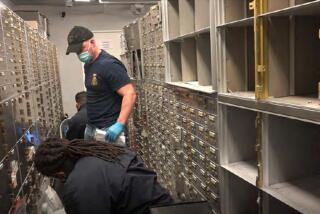Class Action Is Denied by Court in Shiley Lawsuit : Litigation: A federal judge holds that some recipients of the heart valve might be suffering no distress at all. Individual suits are not affected.
- Share via
IRVINE — A federal judge in Los Angeles on Monday denied class-action status for a lawsuit filed on behalf of an estimated 55,000 patients with potentially defective mechanical heart valves manufactured by Shiley Inc. of Irvine.
And in a separate ruling that was also favorable to Shiley, a state appellate court in Santa Ana last Friday ordered a lower court to reconsider its decision allowing a Canadian recipient of a Shiley valve to sue the company in California.
“Both of these decisions are obviously welcome,” Robert Fauteux, a Shiley spokesman, said. “We’re going to defend (against) this litigation.”
Shiley, a subsidiary of New York-based Pfizer Inc., distributed about 86,000 Bjork-Shiley “Convexo-Concave” valves worldwide between 1979 and 1986. As of Feb. 28, the company had confirmed reports of 431 cases in which a valve strut fractured after implantation. More than 265 of those valve recipients have died. An estimated 53,000 to 55,000 people are still living with Shiley valves that have not failed.
After reports of fractured valves began to mount in the early 1980s, Shiley voluntarily took the valves off the market in 1986 without conceding that they were flawed. Last December, under pressure from the U.S. Food and Drug Administration, the company initiated a program to notify valve recipients of the potential problems.
Monday’s ruling by U.S. District Judge Harry L. Hupp does not affect hundreds of individual lawsuits filed against Shiley in Orange and Los Angeles counties, as well as in other states.
The decision, however, denies a Miami law firm’s effort to establish a class-action, emotional distress lawsuit on behalf of all Shiley valve recipients who are still living. In reaching his decision, Hupp said the circumstances surrounding the implantation of each valve, as well as the degree of emotional distress suffered by each patient, vary too much to qualify as a class action.
For instance, the judge said, an implantee with a working valve who had not even heard about the strut problem--or one who knew about it but was just glad to be alive--might be suffering no distress at all. Others, however, might be suffering “substantial” distress, he said.
“We’ll have to find another avenue,” said Joel S. Magolnick, the plaintiffs’ attorney. “Our next step is to sit down and look at our options. We may decide to come back with a more limited class.”
James Capretz, an Irvine attorney representing more than 200 Shiley patients, said Hupp’s decision was not much of a surprise.
“Class action is just not an available remedy, certainly not in California,” he said.
Capretz, meanwhile, suffered a setback in one of his own cases when the 4th District Court of Appeal in Santa Ana ordered the Orange County Superior Court to reconsider its decision to let Canadian citizens George and Wanda Retzlaff sue Shiley in California.
George Retzlaff was 61 years old when he received a Shiley heart valve in 1982. Retzlaff, who still has the valve implant, and his wife sued the company in 1989 for emotional distress and on other grounds.
Writing a majority opinion for a three-judge panel, Justice Thomas F. Crosby Jr. said the lower court was wrong to rely on a 1986 Court of Appeal ruling in Los Angeles that granted foreign citizens greater leeway to sue in California courts.
“It was disappointing but not unexpected,” Capretz said. “We believe the court has ruled incorrectly, but it’s consistent with its prior rulings.”
The California Supreme Court has agreed to rule on a similar issue in two lawsuits filed by the families of two Scandinavian men who died after their Shiley valves fractured. In both cases, the Santa Ana appellate court had ruled that the cases should be tried overseas.
But the state Supreme Court’s decision is not expected for at least nine months, and even then, Capretz said, it may not apply in the Retzlaffs’ situation.
One of the issues in determining if foreigners may sue in California, Capretz explained, is whether they would have legal recourse in their country. In Canada, Capretz said, plaintiffs cannot sue for emotional distress caused by fraud--one of the Retzlaffs’ key claims--and therefore must pursue their case in California.
Also, Capretz said, Californians benefit when companies here are held accountable for their actions abroad.
“The defendant is here in California, and there is a strong public interest to see that high standards are maintained,” he said.
But Fauteux, the Shiley spokesman, said California has traditionally followed a rule saying that foreigners may not sue here “simply because it’s more advantageous.”
More to Read
Inside the business of entertainment
The Wide Shot brings you news, analysis and insights on everything from streaming wars to production — and what it all means for the future.
You may occasionally receive promotional content from the Los Angeles Times.










